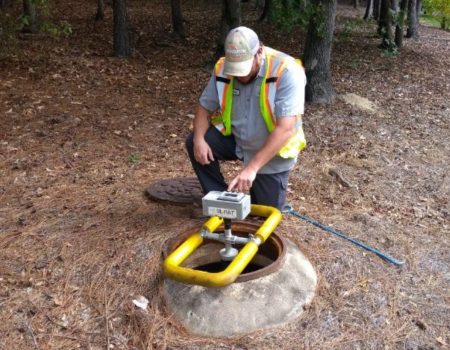SL-RAT at Little Rock Water Reclamation Authority
Little Rock looked to enhance their sophisticated cleaning program and reduce sanitary sewer overflow count by implementing new technologies.
0 SL-RAT User Since
0 Miles of Sewer
0 Population

Transitioning to a Condition-Based Cleaning Program
With a time-based maintenance program, Little Rock annually serviced 40% of their small diameter collection system using high-cost resources such as CCTV or cleaning. Some of these serviced segments had plenty of flow capacity, while blockages in other parts of the system were missed and causing overflows. Despite having a highly sophisticated cleaning program, Little Rock looked to enhance their program and reduce sanitary sewer overflow count.
“Condition-based cleaning strategy has added meaning to the operators’ daily tasks.”
– Tim Harrison, Program Supervisor – Asset Management, LRWRA
Comparison of SSOs to % of System Inspected at LRWRA
Condition-Based Cleaning Reduces overflow count by 64%
In January 2017, Little Rock launched their acoustic program to rapidly screen their small diameter pipes for blockages. They focused high cost resources such as cleaning and CCTV on the 20% of their system that received poor acoustic scores. By deploying resources based on condition rather than time, Little Rock reduced time spent cleaning clean pipes. Without increasing personnel count, they reduced sanitary sewer overflow count by 64%.
Cleaning Less, Removing More
With a condition-based maintenance strategy, Little Rock cleaned 32% fewer linear feet and reduced time spent cleaning by 21%. However, they increased debris removed by 116%. Spending less time to remove significantly more debris from their system proved that resource deployment is more effective under a condition-based cleaning strategy.
21% Reduction in man hours
32% Reduction in feet cleaned
117% Increase in debris removed
Little Rock Reclamation Authority Resources
Little Rock One Pager (2019)
View one page synopsis of Little Rock’s program results here.
Little Rock Case Study (2019)
WEFTEC Paper (2018)
RATs in the House – How Little Rock Water Reclamation Authority Moved from a Time-Based to a Condition-Based Sewer Cleaning Strategy.
Authors: Tim Harrison, LRWRA & Alex Churchill, InfoSense
See full paper (13 pages) here.
WEFTEC Presentation (2018)
RATs in the House – How Little Rock Water Reclamation Authority Moved from a Time-Based to a Condition-Based Sewer Cleaning Strategy.
Presenters: Tim Harrison, LRWRA & Alex Churchill, InfoSense
See full presentation here.